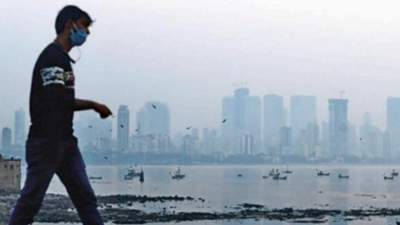- News
- City News
- hubballi News
- Hubballi, Bengaluru most-polluted cities during summer, says study
Hubballi, Bengaluru most-polluted cities during summer, says study

Most polluted city in the region was Hyderabad with summer average of 47 g/m³ followed by Bengaluru and Hubballi with 40 g/m³
HUBBALLI: Bengaluru and Hubballi were the two most-polluted cities in south India the previous summer. Vijayapura is the least-polluted city, while Mangaluru has registered a declining trend in both summer average and peak compared to the previous summer.
A study conducted by the Delhi-based Centre for Science and Environment (CSE) has revealed that smaller cities are becoming pollution hotspots than mega cities.
CSE has said that the data was collected from Central Pollution Control Board's (CPCB) official portal, and Central Control Room for Air Quality Management. "The data has been captured from 356 official stations under the Continuous Ambient Air Quality Monitoring System (CAAQMS) spread across 174 cities in 26 states and Union Territories," it added.
As Karnataka has 23 real-time stations, city-wide average is used for analysis, and 39 cities of south India were chosen for the study.
Most polluted city in the region was Hyderabad with summer average of 47 g/m³ followed by Bengaluru and Hubballi with 40 g/m³. Hubballi has registered peak with 76 g/m³ while Bengaluru's peak summer pollution is 63 g/m³. Along with Gummidipoondi in Tamil Nadu, Karnataka's Vijayapura has recorded the lowest summer average in the south India.
Madikeri, Bengaluru and Chikkaballapura have been identified among eight cities in the region that have shown increasing trend - that is, both summer average and peak have increased compared to their previous summer. Hubballi and Yadgir have been identified among six cities in the region that show mixed trend in their summer average and peak pollution level compared to the previous summer.
Mangaluru is one among five cities in the region that has shown declining trend in both summer average and peak decreased compared to its previous summer. It has shown the most divergent trend with a decline in peak average by 73%, and summer average decline by 31%.
Vaman Acharya, former chairman of Karnataka State Pollution Control Board, said there are mainly three reasons fort the summer pollution to increase in smaller cities. "Though they are not industrialised in a big way, construction works like road doubling are causing dust. The number of trees is decreasing compared to tier-1 cities. Construction waste from old buildings' demolition is not being disposed properly. So there is a need to tackle the issue on a priority."
A study conducted by the Delhi-based Centre for Science and Environment (CSE) has revealed that smaller cities are becoming pollution hotspots than mega cities.
CSE has said that the data was collected from Central Pollution Control Board's (CPCB) official portal, and Central Control Room for Air Quality Management. "The data has been captured from 356 official stations under the Continuous Ambient Air Quality Monitoring System (CAAQMS) spread across 174 cities in 26 states and Union Territories," it added.
As Karnataka has 23 real-time stations, city-wide average is used for analysis, and 39 cities of south India were chosen for the study.
Most polluted city in the region was Hyderabad with summer average of 47 g/m³ followed by Bengaluru and Hubballi with 40 g/m³. Hubballi has registered peak with 76 g/m³ while Bengaluru's peak summer pollution is 63 g/m³. Along with Gummidipoondi in Tamil Nadu, Karnataka's Vijayapura has recorded the lowest summer average in the south India.
Madikeri, Bengaluru and Chikkaballapura have been identified among eight cities in the region that have shown increasing trend - that is, both summer average and peak have increased compared to their previous summer. Hubballi and Yadgir have been identified among six cities in the region that show mixed trend in their summer average and peak pollution level compared to the previous summer.
Mangaluru is one among five cities in the region that has shown declining trend in both summer average and peak decreased compared to its previous summer. It has shown the most divergent trend with a decline in peak average by 73%, and summer average decline by 31%.
Vaman Acharya, former chairman of Karnataka State Pollution Control Board, said there are mainly three reasons fort the summer pollution to increase in smaller cities. "Though they are not industrialised in a big way, construction works like road doubling are causing dust. The number of trees is decreasing compared to tier-1 cities. Construction waste from old buildings' demolition is not being disposed properly. So there is a need to tackle the issue on a priority."
FOLLOW US ON SOCIAL MEDIA
FacebookTwitterInstagramKOO APPYOUTUBE
Start a Conversation
end of article










